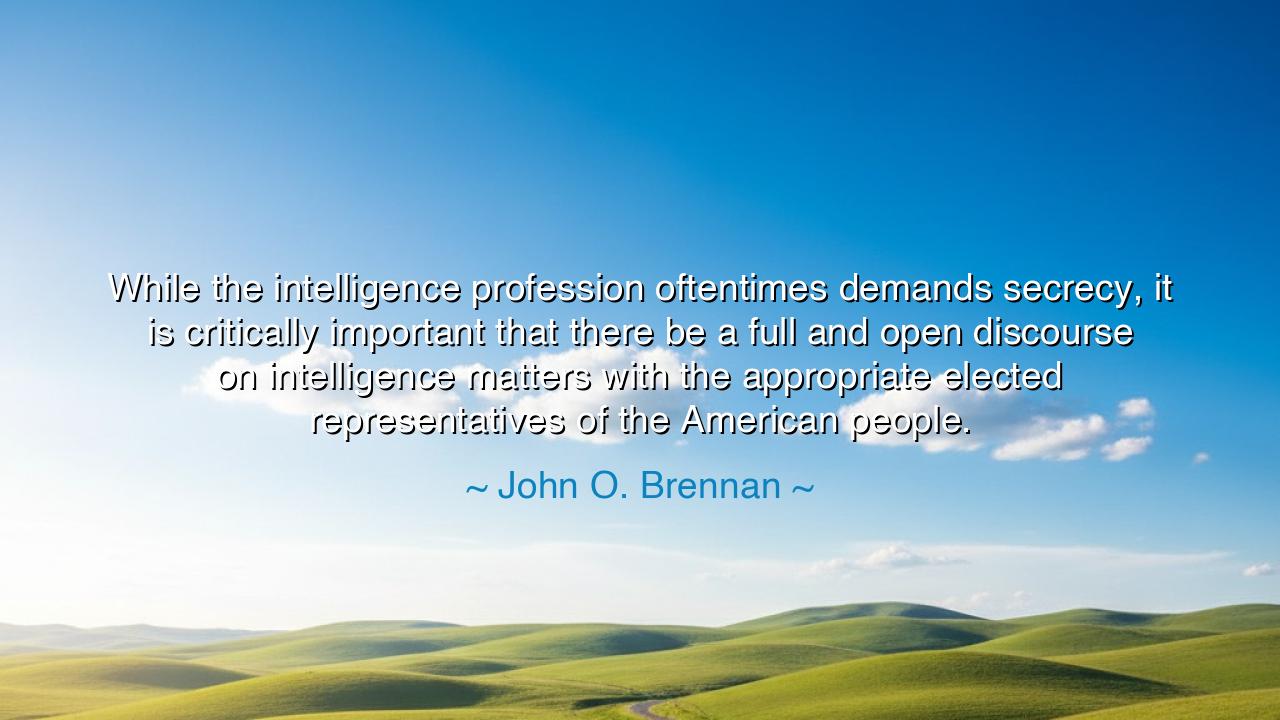
While the intelligence profession oftentimes demands secrecy, it
While the intelligence profession oftentimes demands secrecy, it is critically important that there be a full and open discourse on intelligence matters with the appropriate elected representatives of the American people.






When John O. Brennan, the former Director of the Central Intelligence Agency, declared, “While the intelligence profession oftentimes demands secrecy, it is critically important that there be a full and open discourse on intelligence matters with the appropriate elected representatives of the American people,” he was speaking from the crossroads of power and accountability, where the shadows of secrecy must forever be balanced by the light of democracy. His words carry the gravity of one who has walked in the deepest corridors of statecraft — where knowledge can defend or destroy, and where silence itself can become both shield and weapon. Brennan’s reflection is a call to preserve the sacred covenant between security and freedom, reminding us that the strength of a nation lies not only in its intelligence, but in its integrity.
The origin of this quote arises from Brennan’s long career within the intelligence community — a life spent navigating the unseen wars of nations. Having served as both an intelligence officer and a senior advisor to presidents, he understood better than most the paradox that defines the profession: that secrecy is both necessary and dangerous. Intelligence agencies exist to protect the nation from threats both visible and hidden; yet in their silence, they can drift into realms beyond oversight. Brennan’s statement acknowledges this eternal tension: that even those who work in darkness must answer to the voice of the people, spoken through their elected guardians. For in a republic, even the shadows must remain under the watch of light.
In ancient terms, his wisdom mirrors that of the philosophers and statesmen who wrestled with the balance between truth and power. The philosopher Plato warned that rulers who guard too many secrets would come to believe themselves gods, losing touch with the governed. The Roman Republic, too, built systems of accountability to prevent the concentration of unchecked power. The Senate demanded transparency from generals and governors who fought wars abroad — for they knew that authority without scrutiny leads to corruption, and that secrecy, though vital to strategy, must never be allowed to swallow justice. Brennan’s words, spoken in the modern age, echo this timeless law: that no profession, however noble, can exist beyond the reach of public responsibility.
One need only look to history to see the cost of forgetting this truth. In the 1970s, after years of secrecy and abuse, the Church Committee of the United States Senate uncovered the deep excesses of intelligence agencies — surveillance of citizens, covert manipulations of foreign governments, and violations of law done in the name of national security. The revelations shook the nation, for they revealed how easily good intentions can turn to tyranny when left unobserved. Yet from that crisis came reform — oversight committees, transparency mechanisms, and new trust between the government and the governed. Brennan’s quote is born from that lineage — a reminder that secrecy without accountability leads to decay, but transparency without discretion leads to vulnerability. The wise state, like the wise man, must learn balance.
His words also speak to the moral heart of governance. Secrecy, when used rightly, protects life; when abused, it endangers the soul of a nation. The intelligence officer may work unseen, but he must never forget for whom he serves. The people, though distant from his world, are the true masters of his mission. To share knowledge with their representatives — those entrusted to hold government accountable — is not merely a legal obligation but a moral one. It affirms that even the hidden workings of the state exist within the framework of democracy. Without this, the protectors become the rulers, and the republic becomes the empire of shadows.
This principle extends beyond politics. In our own lives, we too keep secrets — within families, in friendships, in work. There are moments when silence is wisdom and discretion is duty. Yet Brennan’s words remind us that truth must always find its rightful audience. Silence should serve integrity, not hide deceit. To live honorably is to know when to speak and when to withhold, when to reveal and when to protect. The same virtue that guards nations guards souls: transparency guided by conscience.
So, my child, take this lesson from the ancient and the modern alike: power must always answer to principle. Secrecy without conscience is poison, but transparency without prudence is chaos. Whether in the halls of government or in the chambers of your own heart, let your actions be accountable to truth. When you hold knowledge, hold it as a sacred trust — never as a weapon for pride or domination. And remember always what Brennan sought to preserve: that the health of any free nation, and the honor of any free soul, rests upon this eternal truth — that even in the darkest rooms, the light of honesty and accountability must never be extinguished.






AAdministratorAdministrator
Welcome, honored guests. Please leave a comment, we will respond soon